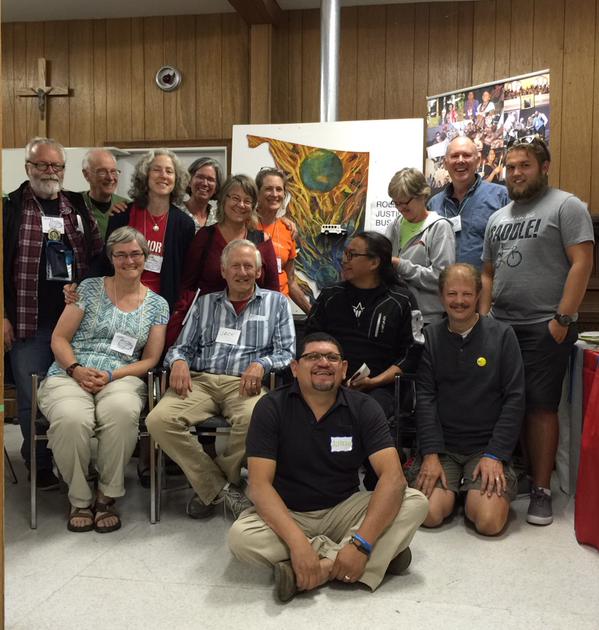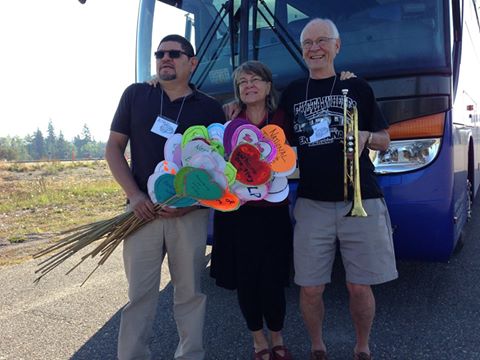Please support our coverage of democratic movements and become a supporter of rabble.ca.
We traveled for eight days in late August from Vancouver through the heartland of British Columbia to Fort St. John and back again on the Rolling Justice Bus.
Our purpose? We wanted to connect with First Nations, faith-based groups, environmentalists and others following the formal close of the Truth and Reconciliation Commission in June. We wanted to connect the dots and see how we might contribute to reconciliation. As mostly urban dwellers, we were making an explicit effort to connect with people living in rural areas.
We heard and responded to issues including the residential school experiences and treatment of Indigenous peoples over our history together on Turtle Island, the disappearance and murder of Aboriginal women, racism, resource extraction and food security.
I don’t think any of us could have imagined the open hearts and welcomes we would receive all along the way — and the learning.
We started out with 18 travelers including our driver. Most of us had never met before. Our bus trip was sponsored by B.C.-Yukon KAIROS which is part of KAIROS Canada, a faith-based organization which unites eleven Christian churches and religious organizations across Canada.
You probably remember the Federal government’s decision to cut KAIROS’s CIDA funding. As far as we can tell, that was because KAIROS fights for social justice.
But not everyone on board came from a faith perspective. We had perspectives ranging from faith, multi-faith and no faith. And, we were joined by an Amnesty International staff person.
We always met in circles. Our first visit was along the Fraser River with members of the Sto:lo Nation where we were gifted with stories of their heritage and an elder’s advice to keep our hearts open on our travels.
In Kamloops, we met with local groups concerned about the proposed copper/gold mine on the edge of town. We were encouraged to hear that the T’Kemlups Indian Band has made a declaration for land and title rights at the mine site.
We held a vigil in Prince George to honour the murdered and missing Aboriginal women and girls. We learned that most were not hitchhiking when they disappeared. Just out walking, running errands or going to meet someone. Never came back.
Visiting at the side of Moberly Lake near the Peace River, we heard about the First Nations history of the Peace and more about what it feels like to be a First Nations woman with the problems of domestic abuse and the ongoing fear of violence and early death at the hands of an unknown assailant.
We knew already about the sex trade that follows remote mining developments around the world. But it was made more real when we learned that while Canada has large camps of men working on resource projects in this country, there is inadequate support for local women who can become victims of violence and abuse. And, it seems racism plays its part in all of this.
We held a carwash (truck wash, actually) in the parking lot of the Treaty 8 First Nations in Fort St. John in support of their treaty rights case against Site C. We had plenty of business but there was also uneasiness in the air.
There we found ourselves asking whether it really is a question of jobs versus the environment. Hell, it’s not just the oil and gas workers whose wages derive from resource extraction. B.C.’s economy is a sort of a one-trick pony. Liquefied natural gas is more of the same.
Maybe if governments had a vision, actually paying attention to the science and signs of global warming, we could ease the tension. Of course, we still need jobs in oil and gas but with a real-live transition strategy, we could all feel we are pulling in the same direction. Imagine that — it’s not us versus them after all!
Same goes for Site C. Did you know that the B.C. Government pulled the Peace River Valley out of the Agricultural Land Reserve and fired its Chair? He’s quoted as saying that it would be a “sin against humanity” to flood that prime farmland.
And, it turns out that Site C would flood an area of farmland equivalent to flooding Richmond to Chilliwack in British Columbia!
How about that the B.C. Government passed the Clean Energy Act (get that fancy title — seems popular amongst governments these days to mislabel their bills and keep us guessing)? That act removed the B.C. Utilities Commission (BCUC) from undertaking an independent and expert review of the Site C proposal. Probably because the Commission has already ruled twice that it makes no economic or social sense. We don’t need the power. We need the farmland.
And, we don’t have free prior and informed consent from the Treaty 8 First Nations to proceed! Where is the justice?
We were hosted at a potluck barbeque by landowners, ranchers, environmentalists and First Nations, all united with a vision to save the Peace River Valley.
They are calling for a two-year moratorium and a full BCUC review. Good thing that more than 30 municipalities in B.C. have signed on to pressure the Clark government to slow down and think this over. And, most importantly, think this over with the public interest in mind!
We’ll just tell you about one more circle we held. That was in Prince George with the local Amnesty International group and a group called “Stand Up for the North.” These “Stand Up” folks are a diverse group. No political affiliation. No faith-based affiliation. No affiliation at all except an abiding interest in fostering public discussion (through public forums) of current issues facing their communities. A new form of democracy considering where the (Un)fair Elections Act has us headed! They say we need to not only return to where we once were in terms of our democracy, but go a bunch of steps further by fostering informed citizens who participate in civic society.
As we came back through Kamloops we met with an Arthur Manuel, an Aboriginal leader, and visited the old residential school there.
It was quite a trip! We found that connecting with others with open minds and open hearts let others know there were folks from away who cared deeply about their struggles. Some said they were honoured by our interest and our visit.

We were the most honoured.
Keep the Peace!
Steve Gray and Zsuzsa Harsman, participants of the Rolling Justice Bus
Please support our coverage of democratic movements and become a supporter of rabble.ca.




